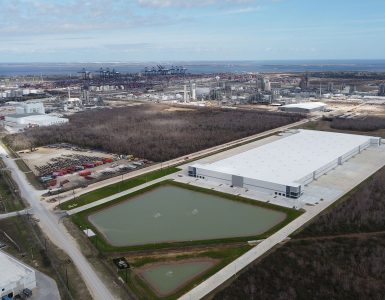The year ahead: What does 2021 hold in store for real estate investors?
Institutional Real Estate Inc., Jan. 1, 2021
By Kali Persall
At the beginning of 2020, the outlook for commercial real estate was very different from the outlook going into 2021. The United States was in the midst of one of the longest economic expansions in the country’s history. In Europe, real estate investments generated firm cash flow and returns, and the Asia Pacific market was primed to enjoy ample liquidity throughout the year. Talk of an impending recession was still only that — talk. Then an economic downturn, thrust into motion by the coronavirus pandemic, rocked the global commercial real estate market, causing global GDP to face its worst contraction since the Great Depression. Nevertheless, moving into 2021, “this too shall pass” seems to be the resounding message among real estate investors.
“For several years, real estate investors have been anticipating a correction, and the COVID-19 pandemic finally provided the catalyst for one,” says Nancy Lashine, founder and managing partner of Park Madison Partners. “In many ways, the depth and speed of the downturn provided a live stress test for real estate markets, underscoring the strengths of certain property sectors while exposing the weaknesses of others. That information becomes invaluable as real estate investors seek to deploy capital in 2021 and beyond.”
In 2020, the various property markets were disproportionately affected, with sectors such as office, retail and hospitality showing significant losses while industrial/logistics and multifamily assets retained strong fundamentals. Trends that were already in place, such as remote work, picked up momentum, and alternative assets that were gaining traction prior to the pandemic, such as data centers, also promoted from “nice-to-have” to “must-have” investments.
Harrison Street, which invests in alternative, nontraditional asset classes with demographic-driven and needs-based demand, expects 2021 to be a continuation of such investments — particularly in education, healthcare, life sciences and storage real estate. These sectors have proven to be resilient throughout economic cycles because their demand drivers are largely uncorrelated to GDP growth or broader macroeconomic issues.
“We are energized by what we believe will be an excellent 2021 for our sectors,” says Christopher Merrill, co-founder, chairman and CEO of Harrison Street. “This is not the first time we have been through a black swan event. We saw great returns coming out of the GFC, and we believe we will see this again.”
Despite the disruptors to needs-based real estate, such as online learning, telemedicine or in-home senior care, Merrill expects these to perform on a better risk-adjusted basis than traditional real estate over the coming decades.
“We have found that these alternatives do not replace the experience of seeing a physician in person, learning on a college campus, or living in a senior care facility with safe and quality care,” he adds.
A market in flux
Larry Heard, CEO of the Transwestern companies, points to a “yield-starved and low interest-rate environment” as the driver of strong yields in the commercial real estate space, which he argues have generally outperformed alternative investments during this period. Heard expects that to continue in 2021, particularly in sectors that exhibit strong demand, such as industrial, multifamily, life sciences, healthcare and select office assets. Despite the uncertain economic environment, Heard says there is a “tidal wave of equity capital keen to invest in real estate.” Transwestern Investment Group, which continued to actively invest in the real estate market throughout the pandemic, expected to close more than $286 million in acquisitions across the United States in 2020. Heard believes the healthcare and office sectors may undergo a transformation in terms of layout, design and usage, but both of these asset classes will provide solid investment options in high-growth markets.
“It will be a number of years before business travel returns to pre-pandemic levels,” says Heard. “In related fashion, hotel occupancy has been substantially impaired by the dramatic and almost overnight curtailment of business travel. Retailers that have been able to pivot to online sales will continue to survive, and in a few cases thrive, but it will be a slower return for experiential retail, including restaurants, entertainment and fitness. Nonetheless, opportunities will exist in each sector, going forward, for the discerning and experienced investor.”
Experts agree, the pandemic has shaken up the commercial real estate market for investors around the world, which could bring a new set of opportunities and risks in 2021.
“The world has moved toward an increasingly risk-off environment during 2020, to such an extent that uncertainty in the markets is becoming the ‘new normal’,” says Jose Pellicer, head of investment strategy at M&G Real Estate. “At the same time, as bond levels and interest rates remain low across the U.K. and Europe, real assets have emerged as the asset class best placed to offer a safe haven to multi-asset investors.”
Opportunities and challenges in 2021
Spencer Levy, chairman of Americas research and senior economic adviser for CBRE, says 2021 is likely to see a slow start due to expanded lockdown restrictions. From a macroeconomic perspective, the market could see a rapid bounce back shortly thereafter. Levy predicts fundamentals could start improving as early as second half 2021. With a vaccine on the market, the third quarter could compound that bounce back. CBRE expects to see outsize growth in 2021 and 2022 spurred by pent-up demand and additional tailwinds from fiscal and monetary stimulus, particularly for hotels and retail, according to Levy.
“2021 will be the tale of two worlds for CRE,” says Levy. “The first half will be very similar to the second half of 2020, with marginally improving credit conditions and fundamentals, with more people gradually returning to the workplace. This will lead to continued improvement, albeit slow, in both capital markets and leasing volume in H1 2021, with capital markets leading the way, as it always does coming out of a recession.”
By second half 2021, Levy is anticipating a material improvement in all commercial real estate types, except industrial, “which has done so well during the pandemic that it’s hard to see how much better it can get, particularly as some capital shifts to the other asset types,” he adds.
Office leasing is also expected to experience a significant bump in the second half of 2021, according to CBRE.
With respect to the office sector, Will Pattison, head of real estate research and strategy at MetLife Investment Management, believes the market currently has the most uncertainty surrounding it, largely due to companies’ work-from-home policies. Pattison says MetLife is generally more negative than its peers in forecasting office demand during the next one to two years, but more positive in the medium and long terms.
“Before the pandemic, a number of major corporations tried work-from-home, and of those we were able to track, there was either partial or complete reversal of that decision after one to two years,” says Pattison. “We believe 2021 will be the year of companies trying to make full-time work-from-home permanent, but we also think those companies will largely reverse those decisions and return to the office by 2022 or 2023.”
In his November 2020 report about how short-term forecasts could drive mispricing in the U.S. office sector, Pattison posited many investors may be misled by short-term negative sentiment against certain real estate markets, creating a unique buying opportunity for investors over the next several years.
In the United Kingdom, Brexit uncertainty has allowed investors to take advantage of a higher property risk premium for U.K. real estate — particularly in the office sector — than other European markets, adds Pellicer.
“Despite the potential uncertainty around the future role of offices, we forecast a sustained demand for office space in key employment hubs, particularly those offering amenities which encourage productivity and collaboration and support well-being,” says Pellicer. “There is mounting evidence of a softening of attitudes toward remote working in Asia, which may affect future demand for office space.”
Where does the U.S. election leave investors?
There has been much debate about how the administration of U.S. President-elect Joe Biden will affect real estate investment prospects in 2021. Industry experts, however, say it is not as much of a factor as one might expect. It all comes down to Congress — and more important, a vaccine.
“The presidential election has less of an impact on commercial real estate investments than many may think,” says Pattison. “Real estate demand is primarily driven by population growth and the labor market, and changes in things like the federal income and corporate tax rates, therefore, only have indirect effects on real estate.”
“If control of Congress remains divided — as appears likely — we expect fiscal stimulus measures for the next two years to be modest at best,” explains Lashine. “That leaves markets looking to the Federal Reserve to support the recovery, which likely means near-zero interest rates for the foreseeable future. And low rates tend to enhance real estate’s attractiveness as a yield alternative.”
Merrill believes a Biden administration with a Republican-led Senate will not offer much change to the current economic landscape; however, one could offer that the new administration may be more favorable to real asset investing. Pellicer agrees the Senate is key because it could bring more investment into infrastructure and green buildings — better for long-term real estate prospects. (Two run-off elections in Georgia in early January will determine which party has a bare majority in the Senate; most analysts expect the Republicans to maintain control.)
Heard believes, specific to this election, the treatment of carried interest and capital gains will be an area of focused interest for the commercial real estate industry. “Currently, investment fund managers and developers are rewarded for the risk they undertake in their businesses with capital-gains treatment on their profits,” says Heard. “If these activities receive ordinary income treatment in the future, it could cause a risk/reward imbalance to arise and curtail an important component of the country’s future economic expansion.”
A vaccine is only the beginning
Setting aside the U.S. election, experts are expecting the rollout of a vaccine to help turn commercial real estate markets around, but many agree much work lies ahead to bring the various property types up to pre-pandemic levels.
“Obviously, the positive momentum is highly dependent on a successful vaccine available in quantity to immunize large swaths of the population, so that people feel free to travel, congregate and go to work again,” notes Lashine. “If these things move forward as anticipated today by the markets and the current announcements, there will be recovery for urban areas, and hospitality, office and retail, and the markets will head back in an upward trajectory.”
Lashine cautions, however, “We may have COVID under control in a year, but it will take several more to rebuild the economic damage to urban markets and businesses around the country.”
Pellicer agrees. “We are heading toward a recovery, even if uncertainty is still prevalent, but different countries will take different paths toward that recovery,” he adds. “The pandemic has also shone a light on ESG, and we are already seeing growing momentum among investors who are keen to take a more proactive and considered investment approach in the real estate sector.”
Shorter Leases are Adding a Wrinkle to Underwriting Office Investments
Wealth Management Real Estate, Jan. 25, 2021
“We continue to hear stories of major corporations and large firms postponing their decisions to renew or sign new office leases, often leading to short-term renewals of 12 to 18 months until they have more clarity on their ability to safely bring employees back to the workplace,” says Leah Gallagher, San Antonio City Leader at Transwestern…
Can Big Tech Float NYC’s Struggling Leasing Market?
New York Post, Jan. 26, 2021
For instance, Transwestern closed 325,000 square feet of deals for charter schools last year and has already closed two deals for Democracy Prep Public Schools totaling 125,000 square feet in The Bronx for new construction and a temporary location…
How Biden’s First Executive Orders Will Impact CRE
Bisnow, Jan. 20, 2021
Transwestern Director of Sustainability Josh Richards said that rejoining the Paris Agreement is necessary and beneficial to the commercial real estate industry…
Will COVID Disrupt Working Mothers’ CRE Careers?
California Building News, Q4 2020
School closures due to COVID-related measures have absolutely disrupted households with working parents. Families with kids that can’t effectively administer remote learning independently have taken on a potentially unmanageable burden…
























